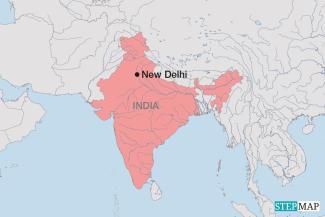Public health
India’s manual scavengers still face serious caste-based exploitation
 StepMap
StepMap
One of the global aspirations, envisioned in the 8th UN Sustainable Development Goal, is the promotion of decent work and economic growth. In India, the prevalence of manual scavenging, a practice that involves informal and oppressed caste workers doing unhygienic and unsafe work, poses a threat towards progress in achieving this goal.
Manual scavenging is a practice where people do blue-collar jobs such as manually cleaning human waste in latrines, open drains and other places. In other instances, scavengers have to go down potholes without any protection gear, while potentially being exposed to toxic waste, including harmful gases and pathogens that can lead to diseases like leptospirosis, hepatitis and helicobacter. It is reported that some people have lost their lives doing this kind of work, although official statistics on the deaths are scant.
Roxy Gagdekar Chhara, a BBC News contributor from the Indian state of Gujarat, while covering a story on the plight of India’s “sewer workers,” affirmed the mystery surrounding statistics on manual scavenging. He referred to an Indian federal minister who told the parliament in 2021 that the government had identified 58,098 manual scavengers in the country through surveys but also added that there was “no report of practice of manual scavenging currently in the country.” His claims are disputed by data from Safai Karmachari Andolan, a movement which works to eliminate manual scavenging. The organisation states that there are more than 770,000 such workers.
Weak enforcement despite legal bans
Tasks performed by manual scavengers are so humiliating that they are usually done in secrecy or at night, so that the “civilised” society doesn’t have to see something so heinous. Officially, manual scavenging is illegal in India.
The country first banned manual scavenging in 1993 with the Employment of Manual Scavenging and Construction of Dry Latrines (Prohibition) Act. In 2013, the Prohibition of Employment as Manual Scavengers and their Rehabilitation Act was passed, mandating the identification of persons engaged in manual scavenging for their liberation and rehabilitation. A year later, in 2014, the Supreme Court of India ruled that manual scavenging violates international human-rights commitments.
Caste-based inequality and structural poverty
Despite the legal regime and the apparent dangers of manual scavenging, poverty leads people to engage in this practice. India’s caste system plays a significant role here, since workers from oppressed castes are particularly affected. The Dalits, the so-called untouchables, and the Adivasis, the indigenous people of India, are among the country’s most oppressed groups. For centuries, they have been ostracised and denied basic human rights. This affects the Dalits and Adivasis adversely, exposing them to poverty, little access to education and even fewer job opportunities. The newspaper Indian Express reported, citing government data, that an overwhelming 97% of manual scavengers in India are Dalits, highlighting the strong link between caste and this practice.
Manual scavenging reveals various problems in Indian society. In addition to the oppression of entire population groups and a lack of labour rights, the country is struggling with inadequate, outdated infrastructure such as poorly maintained public washrooms, flooded roads and dirty drains across public spaces. Whereas the country has made advances in technology, it is lacking proper machines to help keep sanitary infrastructure clean. Under these conditions, manual scavenging provides cheap labour.
Discrimination against oppressed groups in India, including in the workplace, must stop. The people currently working as manual scavengers are trapped in a vicious circle of social discrimination and exclusion from large parts of the labour market. They deserve decent work under dignified conditions, however – just like all other Indians.
Ipil Monica Baski is a freelance writer and activist from India.
ipilbaski16001@gmail.com

